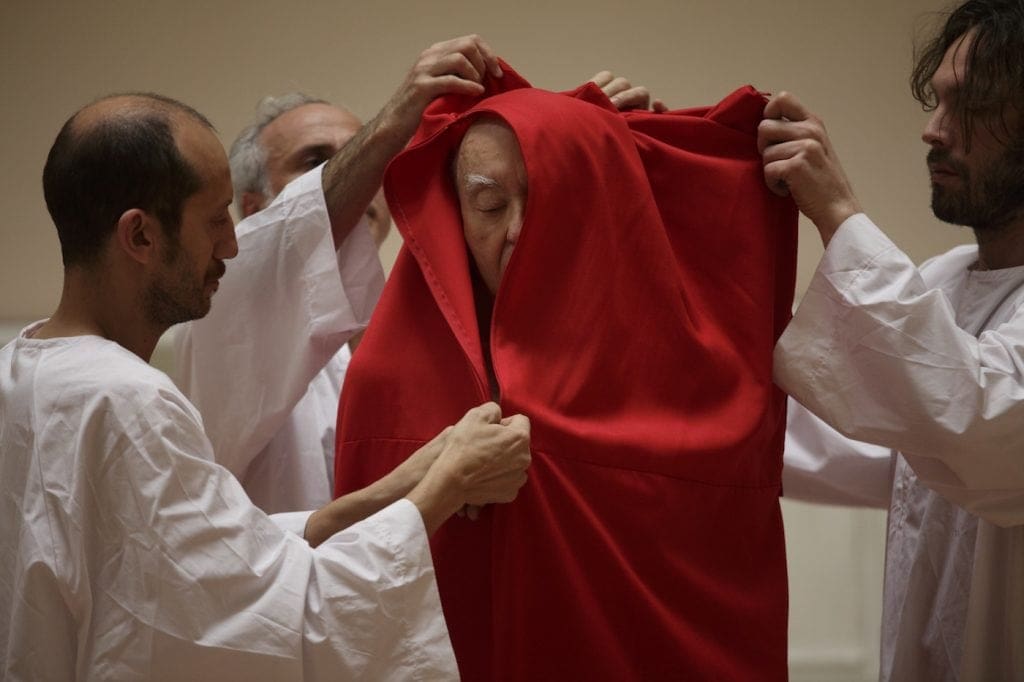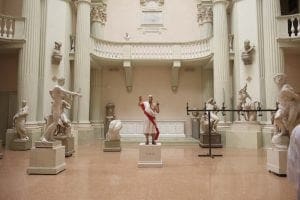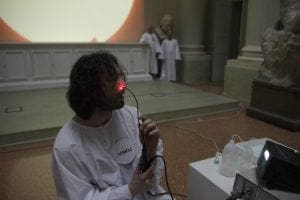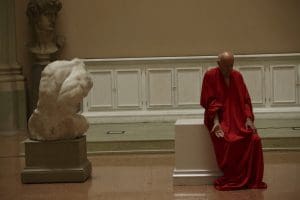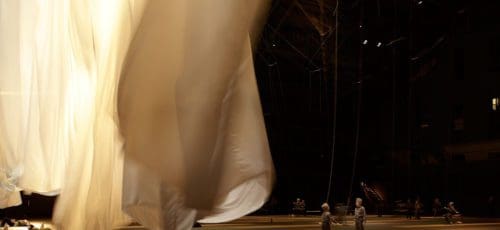Caught in the Throat: On Romeo Castellucci’s Julius Caesar. Spared Parts
This week acclaimed Italian theater artist Romeo Castellucci will return to Philadelphia (following The Four Seasons Restaurant and On the Concept of the Face, Regarding the Son of God) with Julius Caesar. Spared Parts, a re-envisioning of his groundbreaking 1997 production Giulio Cesare distilled to a series of “fragments.” This powerful, visceral work runs from Thursday to Saturday at the Navy Yard, Building 694 as part of the 2016 Fringe Festival. Daniel Sack was on hand for the original premiere in Bologna back in 2014 and wrote the following essay in response.
How can we, as Yeats asked us, know the dancer from the dance? Or, for that matter, the actor from the act? Knowing the speaker from the speech presents no such problem. These are the days of speechwriters and teleprompters, but even in those Ancient Roman days of oratorical improvisation, the treatises of Cicero dictated set tropes of persuasion. We have been, and remain, apart from our speech. In the theatre, as always, this division is doubled over. One speaks the speech that precedes and exceeds its vessel – the actor – Shakespeare’s corpse still sound 450 years after the fact. So Artaud wrote with terror about how his voice escaped himself to play a part that did not belong to his whole. Not only because sound cannot stand still or it would cease to be, not only because it must always leave us, but also because the speaking subject does not possess the word “I” it temporarily claims from a common language.
The prophet foretold such a possession of the voice from without. A kind of pre-attic tragic actor, he is reduced to a carrier for the message of those divine playwrights, the gods. He may retain the grain of his voice – those textures particular to a body, a tongue, a throat – but the content belongs to another. Shakespeare’s Julius Caesar questions not only the performance of rhetoric but also the disjoined nature of prophecy, a prophecy that visits the dreams of Calpurnia, that stalks the city streets in unnatural omens, that speaks in the mouths of soothsayers – resolutely ignored or misapprehended like all good prophecies (Cicero, the central presence in Castellucci’s first imagining of the play also wrote an extended dialogue On Divination). It asks, then, how power, divine or earthly, speaks through the body of another, that spare but necessary part.
No such speech for the masses in this grand hall at the heart of the Accademia di Belle Arti in Bologna; a host of sculptures surround me like some mute chorus, mythic and familiar characters, Neoclassical fragments of Michelangelo’s David and the Laocoön, reduced to but a head or a father clutching at limbs in place of boys. These parts alone are spared. And yet, they are inversions of the monument. Clearly plaster casts, molded imitations of their more weighty granite originals—theatrical sculptures, perhaps, of accumulation rather than chisel’s negation. Set on pedestals of painted wood, it as if they stood frozen for eternity on a small stage, or what we call “the boards.” They are objects for study and future reproduction. In other words, they are characters in a play waiting for something to happen.
The too-fragile figures that will take the space are themselves icons from a more recent theatrical past. Three orators will appear as “spared parts” from the 1997 performance of Giuilio Cesare, remainders caught in the throat. So when the white-robed young man sits before me to begin the performance, I think I, having read and heard many accounts of the earlier event, prophesy what is coming: he will insert an endoscopic camera through his nose and project the interior scene of his throat in motion as he speaks the lines from the opening dialogue of Shakespeare’s play. But the descent into his interior strikes me in ways unforeseen. I see his vocal chords working like some abyssal monster looming at the rear of the stage, and yet as close as a physical presence, thrust down my own throat, so that the alien movement seems to work within me, in sympathy. I, too, have this within me. If sound is the sense that envelops the hearer and sight a sense at a remove, here those roles intermingle and I become the theatre. Identified as “…vskij” (in homage to Stanislavskij, the forefather of an interiorized acting), the character will play all the parts in this opening mob scene, mine included, collapsing us all into a single grotesque conglomeration, phlegm.
A second figure, Caesar, shuffles forward in long red robes, lifting the folds to reveal his feet with every step, each amplified terribly throughout the chamber. Is this garb Clytemnestr’s fateful weaving that prophesies death or is he, rather, a theatre onto himself, the red curtain rising to unveil the expected corpse beneath – or, at least, its earthbound soles? In place of speech, he offers up gesticulations, semaphoric accompaniments to a rhetorical game that has been stripped bare of content. It is as if Caesar has already dreamed of Casca’s words to cue the assassination: “Speak hands for me” (3.1). All that remains is the amplified rush of air that a sleeve might make against itself in the pure play of rhetorical calisthenics. Or, again, the theatrical curtain folding on itself, promising to reveal something in the time to come.
A third figure. Here comes Marc Antony, stately in his slow progress down to the pedestal at center not unlike those on which the other casts are mounted. This one, however, says outright what all pedestals merely imply: it is imprinted with the word ‘Ars’, insisting that, despite his claims to the contrary, Antony is the master of the arts of rhetoric. He begins to speak, but what comes forth is something hollowed out. The actor, Dalmazio Masini (17 years removed from his first performance of the part and now 75), has had his larynx removed, so there is a gaping hole where his speech should be, a literalization of Caesar’s many wounds that conclude the character’s famous monologue. He would “put a tongue / in every wound of Caesar that should move / the stones of Rome to rise and mutiny” (3.2) as if to wake these many plaster casts. Antony is the extension of Caesar’s body, his arm according to the conspirators, and the extension of his voice; his first lines in the play announce the fact: “I shall remember: / When Caesar says ‘Do this’, it is performed” (1.2).
Bereft of vocal cords, this esophageal speech comes from the vibrations of the stoma itself. Before my eyes stands the engastrimyth (en “in”, gaster “stomach”, and mythos “word”; one who has a second voice in that seat of digestion, the stomach), the Latinate precedent to our ventriloquist, speaking words and giving breath to a seemingly lifeless other. The most famous of these vessels for non-human voicing were the prophetesses of old, the Delphic oracle seated on her tripod above a crack in the earth, whose winds inspired her to voice forth divine breath. Here, Antony acts the tongue for the dead divinity, Caesar, who cannot witness his own experience posthumously, a gag that, like all tongues, remains undigested.
The profound labor shows across Masini’s performance; he strains under the task. Such is the curse of divination and the burden of the actor, carrying the weight of a role like a messenger. For the ideal messenger is the one who least distorts the message, who allows the event to consume his body of all distinguishing feature, and merely transmits the character of another, an event that cannot speak its own name. These figures bring me so close to the threshold of speech – to vast curtains of flesh or fabric sounding off, to a hole into the very ground of breath. Yet, what appears here in a most felt way is the white noise of the actor’s insistent interruption, his body’s refusal to become transparent or as set as stone. By another name we might call this “presence,” or “living.” This spare part, this throat gagging on its potential to say.
—Daniel Sack
Daniel Sack is the author of After Live: Possibility, Potentiality, and the Future of Performance (2015) and Samuel Beckett’s Krapp’s Last Tape (2016). He is the editor of Imagined Theatres: Writing for a Theoretical Stage (forthcoming 2017), which contains writing by Romeo Castellucci and more than 90 other theorists and artists of the stage. He is on the faculty of the English Department and Commonwealth Honors College at the University of Massachusetts Amherst.

